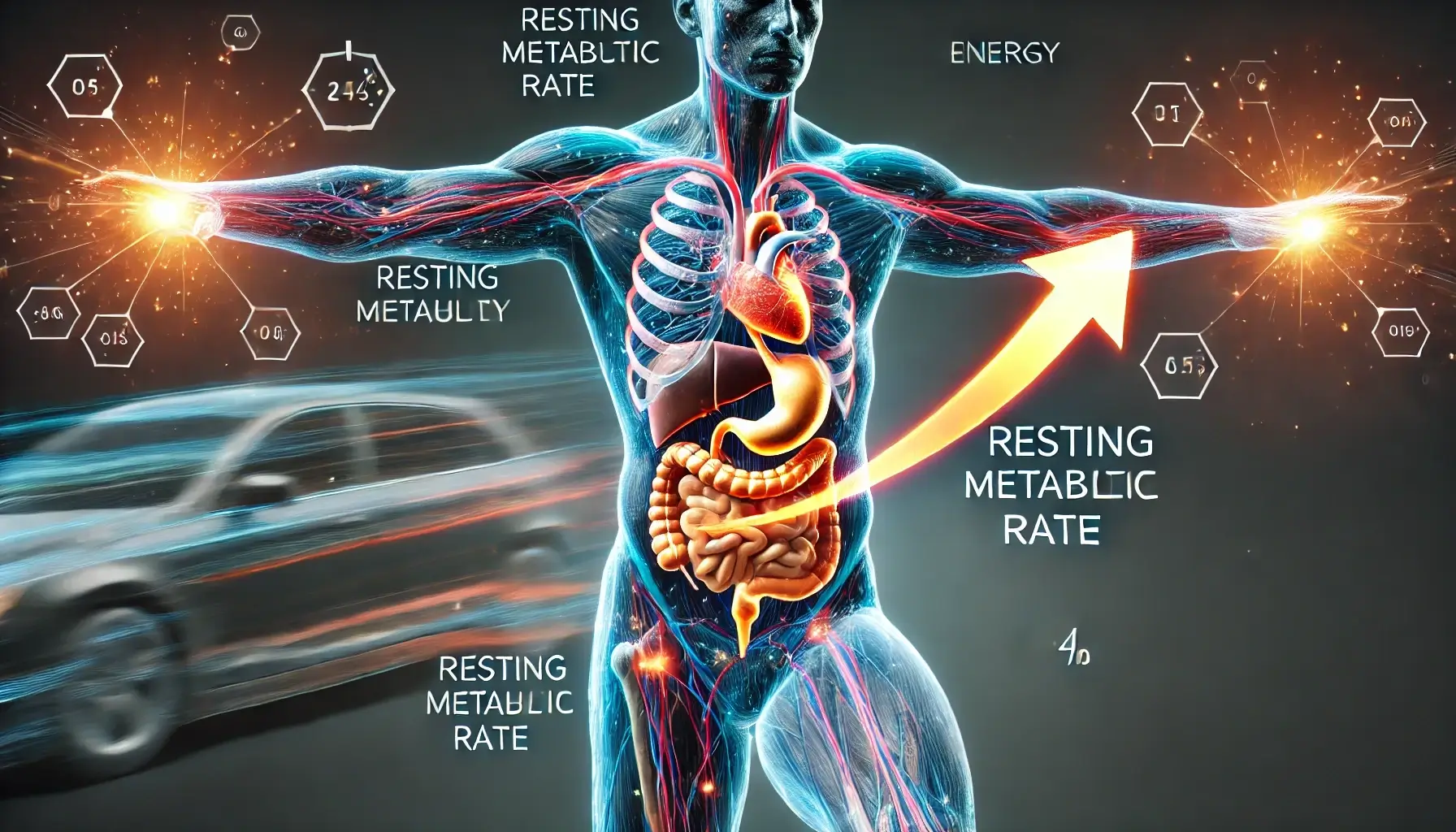Understanding your Resting Metabolic Rate (RMR) is one of the most empowering steps you can take in managing your health, optimizing your weight, and boosting your overall energy levels. Have you ever wondered why some people seem to burn calories effortlessly, while others struggle with weight management despite following similar diets and exercise plans? The answer often lies in RMR, the number of calories your body needs to perform its basic functions while at rest.
In this guide, you’ll not only learn how to calculate your RMR but also discover practical and effective strategies to boost it. From the science behind metabolism to the simple lifestyle changes that can have a big impact, this article will give you all the tools you need to take control of your metabolism and achieve your health and fitness goals.
Table of Contents
What is Resting Metabolic Rate (RMR)?
Your Resting Metabolic Rate (RMR) represents the number of calories your body burns while at rest, just to maintain essential life functions like breathing, digestion, and keeping your heart beating. You burn calories even when you’re doing absolutely nothing. In fact, for most people, RMR accounts for the largest portion of daily calorie expenditure, typically ranging from 60-75% of your total energy needs.
If you’re interested in a structured weight loss approach, check out our guide on the Concentra Weight Management Program, which can complement your RMR-based dietary strategies.
Why is RMR Important?
Understanding and calculating your RMR can help you make better decisions about your diet, exercise routine, and even your sleep patterns. When you know how many calories your body needs just to maintain basic functions, it becomes much easier to adjust your food intake and activity levels to meet your specific health and fitness goals, whether it’s losing weight, gaining muscle, or improving overall wellness.
The Difference Between RMR and BMR
Before we get into calculating your RMR, it’s important to clarify a common point of confusion: RMR and Basal Metabolic Rate (BMR) are closely related, but they are not exactly the same thing.
What is BMR?
BMR, or Basal Metabolic Rate, is the rate at which your body burns calories at complete rest, typically measured in a clinical setting after you’ve fasted for at least 12 hours and are lying completely still. This is a very strict measurement that most people don’t undergo.
RMR vs. BMR
In contrast, RMR is measured in less restrictive conditions. While BMR is usually taken under highly controlled environments (fasting, stillness, and after a full night’s rest), RMR can be calculated after a light breakfast and a brief rest. RMR gives you a broader idea of how many calories your body needs at rest under normal conditions.
Comparison of RMR vs. BMR:
| Criteria | RMR | BMR |
|---|---|---|
| Measurement Condition | Rested but not fasting | Strict rest & fasting |
| Energy Expenditure | 60-75% of daily calories | 60-75% of daily calories |
| Accuracy | More flexible | More precise |
How to Calculate Your Resting Metabolic Rate (RMR)
Knowing how to calculate your RMR is a powerful tool for better understanding your energy needs. There are various methods available to estimate your RMR, ranging from simple equations to more sophisticated tests conducted by health professionals.
Using the Harris-Benedict Equation
One of the most common ways to calculate your RMR is using the Harris-Benedict equation. This equation uses your weight, height, age, and gender to estimate how many calories your body burns at rest. Here’s how you can calculate it:
For men: RMR=88.362+(13.397×weightinkg)+(4.799×heightincm)−(5.677×ageinyears)RMR = 88.362 + (13.397 \times weight in kg) + (4.799 \times height in cm) – (5.677 \times age in years)
For women: RMR=447.593+(9.247×weightinkg)+(3.098×heightincm)−(4.330×ageinyears)RMR = 447.593 + (9.247 \times weight in kg) + (3.098 \times height in cm) – (4.330 \times age in years)
To make the calculations more precise, convert your weight to kilograms and your height to centimeters. For example, if you weigh 150 pounds (68 kg) and are 5’5″ (165 cm), you would plug those numbers into the equation.
Example Calculation for a Woman: Weight = 68 kg, Height = 165 cm, Age = 30 years RMR=447.593+(9.247×68)+(3.098×165)−(4.330×30)=1476.4 calories/dayRMR = 447.593 + (9.247 \times 68) + (3.098 \times 165) – (4.330 \times 30) = 1476.4 \text{ calories/day}
This is a rough estimate of how many calories your body burns at rest.
Other Methods for Measuring RMR
If you’re looking for a more accurate assessment of your RMR, you might consider getting a Metabolic Test through a medical professional. Indirect Calorimetry is one of the most precise methods for measuring RMR, where your oxygen consumption is measured as you breathe normally. This method calculates how many calories your body is burning in real time.
You can also consider Body Composition Tests, which estimate your body fat percentage and muscle mass. More muscle means a higher RMR because muscle tissue burns more calories than fat, even at rest.

Factors That Influence Your RMR
Now that you know how to calculate your RMR, it’s important to understand what influences it. Several factors can either increase or decrease your metabolic rate.
1. Age and Gender
As you get older, your RMR tends to decrease. This is largely due to a natural loss of muscle mass, which is an important driver of metabolism. Men typically have a higher RMR than women because they tend to have more muscle mass.
2. Muscle Mass and Physical Activity
Muscle mass is one of the most significant factors influencing your RMR. The more muscle you have, the higher your RMR will be, meaning your body will burn more calories even when you’re not active. This is why strength training is such a key component of any fitness plan aimed at boosting metabolism.
3. Diet and Nutrition
Your diet can also affect your RMR. For instance, protein-rich foods cause a thermogenic effect, meaning they require more energy to digest than carbohydrates or fats. Eating protein regularly can slightly boost your metabolism and help you burn more calories.
4. Hormonal Factors
Certain hormones play a significant role in regulating metabolism. Thyroid hormones, for instance, influence how efficiently your body burns energy. Hypothyroidism (an underactive thyroid) can slow down your metabolism, while hyperthyroidism (an overactive thyroid) can speed it up.
How to Boost Your Resting Metabolic Rate
It’s not enough to just know your RMR; you’ll want to find ways to boost it. Fortunately, there are several proven strategies you can incorporate into your routine to increase your metabolism.
1. Increase Muscle Mass
The more muscle you have, the higher your RMR. Muscle tissue burns more calories than fat, even while at rest. Strength training is a great way to increase muscle mass and rev up your metabolism.
Strength Training Tips:
- Focus on compound exercises like squats, deadlifts, and bench presses, which work multiple muscle groups.
- Aim for 2-3 strength training sessions per week, gradually increasing the intensity and weight.
2. Eat More Protein
Consuming more protein-rich foods can have a significant impact on your metabolism. Protein requires more energy to digest, meaning you’ll burn more calories during digestion when you eat protein-rich meals.
Examples of Protein-Rich Foods:
- Chicken, turkey, and fish
- Eggs and egg whites
- Legumes, beans, and lentils
- Greek yogurt and cottage cheese
3. Stay Active Throughout the Day
Even small bursts of activity can increase your metabolic rate. Consider incorporating more movement into your day with simple activities like walking, taking the stairs, or doing short bursts of bodyweight exercises.
Ways to Boost Your Daily Activity:
- Walk after meals to aid digestion and increase calorie burn.
- Use a standing desk to decrease sedentary time.
- Take short walking breaks throughout your workday.
4. Stay Hydrated
Drinking water can temporarily increase your metabolism. In fact, drinking cold water may even boost your metabolism more, as your body expends energy warming the water to body temperature.
5. Prioritize Sleep
Lack of sleep can negatively impact your metabolism by disrupting the hormones that regulate hunger and energy. Aim for 7-9 hours of quality sleep each night to support your metabolism and overall health.
If you’re unsure how different weight management programs work, our article on How Do Weight Management Programs Work? explains structured strategies for improving metabolism and maintaining a healthy weight.
RMR and Diet: How to Fuel Your Metabolism
Fueling your body with the right foods is essential for supporting a healthy metabolism. A balanced, nutrient-dense diet can provide the energy and nutrients your body needs to optimize metabolic function.
Metabolic-Boosting Foods:
| Food Group | Examples | Benefits |
|---|---|---|
| Protein | Chicken, fish, beans | Increases RMR through TEF |
| Whole Grains | Oats, quinoa, brown rice | Helps maintain steady energy |
| Healthy Fats | Avocados, olive oil, nuts | Supports hormone balance |
| Vegetables | Spinach, broccoli, carrots | Nutrient-dense, low-calorie |
Frequently Asked Questions (FAQ)
What is the difference between RMR and TDEE?
RMR measures the calories your body burns at rest, while Total Daily Energy Expenditure (TDEE) includes calories burned from all activities throughout the day, including exercise.
How accurate is calculating RMR using the Harris-Benedict equation?
While the Harris-Benedict equation offers a good estimate, it may not account for individual variations like muscle mass or hormonal imbalances. A professional metabolic test will give you a more precise reading.
Can RMR change over time?
Yes, RMR can fluctuate due to factors like aging, changes in muscle mass, physical activity, and diet. Staying active and maintaining muscle mass can help mitigate the natural decline in RMR as you age.
Conclusion: Take Control of Your Metabolism
Now that you know how to calculate your RMR and the factors that influence it, you can make informed decisions about your health and fitness. By incorporating strength training, eating protein-rich foods, staying active, and focusing on sleep, you can boost your metabolism and take control of your energy balance. Whether your goal is weight loss, muscle gain, or just overall wellness, understanding and optimizing your RMR is a crucial step toward achieving lasting success. Start implementing these strategies today and feel empowered to take charge of your metabolism.

